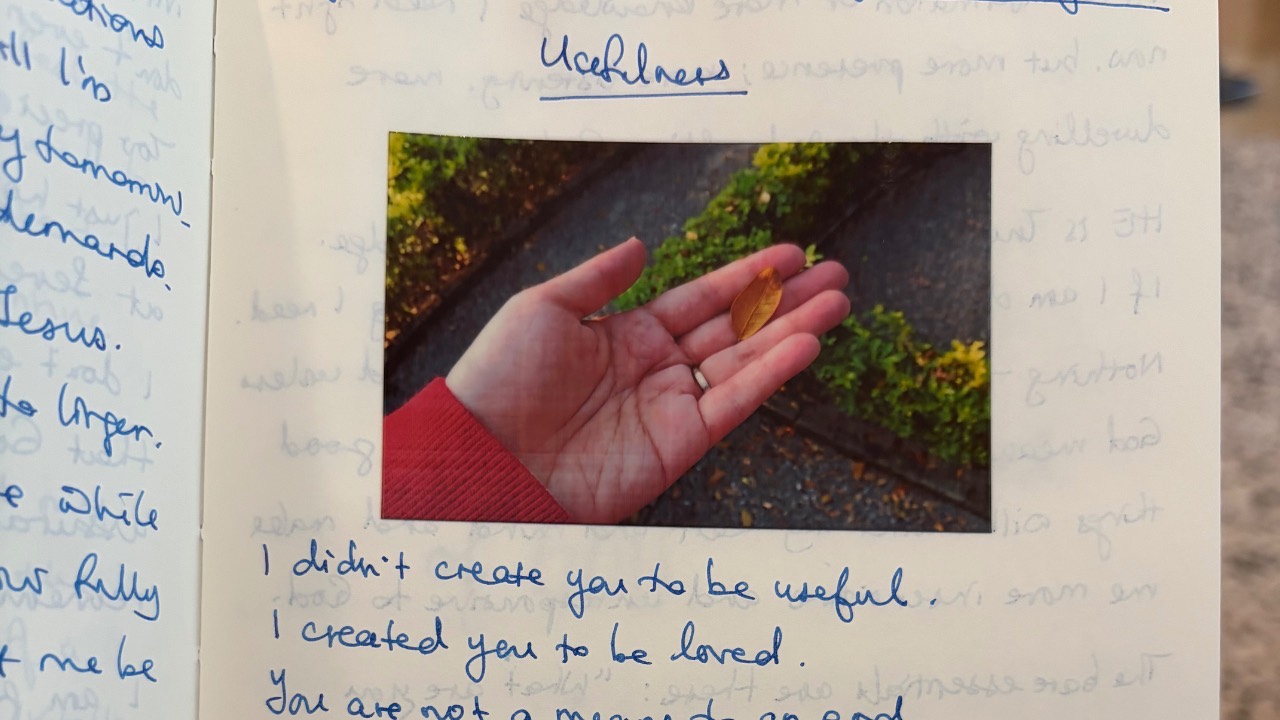How unprocessed generational trauma distorted my faith
My dear fellow pilgrim, have you ever wondered how unprocessed trauma in your family and culture of origin may have distorted how you relate to God and live out your faith?
After I fell in love with Christ, I decided that my faith would be the most important determinant of my identity. I thought that was a wonderful thing and surely something that God wanted for me, and so I set out to be the very best Catholic disciple I could be. I was determined to become a saint long before this became a catchy phrase in Catholic social media or in youth conversion retreats!
The problem was that even as I decided to center my identity around Christ, I could only still interpret, receive and know God from "the outside" because I was not "at home" in my inner self. All the ways that I had learned to cope and find acceptance in my life were brought out in force to live out my faith because those were the only ways I knew to survive. Beyond my own personal history of trauma was the fact that the ways in which God and the Catholic faith had been passed on to me had also been shaped by the trauma of others.
Beyond my own personal history of trauma was the fact that the ways in which God and the Catholic faith had been passed on to me had also been shaped by the trauma of others.
It was only in the last few years that I grew to recognise how much the person who had been my primary influence in coming to faith in Christ has a faith that is terribly distorted by her own unresolved pain. It was only in the last few years that I - as an adult in my forties recovering from complex trauma - could understand and appreciate how my own parents' childhood and family histories were fraught with trauma and how that trauma has been projected onto their image of God, their perspective of the Catholic faith, and their interpretation of what it meant to be a follower of Christ.
...my own parents' childhood and family histories were fraught with trauma and that trauma has been projected onto their image of God, their perspective of the Catholic faith, and their interpretation of what it meant to be a follower of Christ.
As a child I had imbibed all of that without question in my upbringing. In my own emotional desert of loneliness and complex trauma, I further developed a projection of God which echoed my relationships with my parents. From my father came the projection of God as distant, demanding of achievement, and angrily impatient when I am slow to undertand or do what he asks me to. From my mother came the projection that loving others meant never prioritising my own needs and that this was how God loved me and wanted me to love others. From my mother, I also learned that loving others meant saving them from making mistakes and correcting them whenever they did (even if it meant emotional and spiritual manipulation had to be used) because any mistake could inadvertently set them on the path to hell. Sancity was equated with perfectionism at any cost.
From the larger extended family (on both sides), I inherited a need to prove I was right through argument and debate because "being right" and winning arguments secured some sense of safety. I also learned that enmeshment was the only right way of "being a loving family", so I never understood the concept of personal boundaries. I brought all of this into my understanding of and practice as an aspiring Catholic disciple of Christ.
I learned that loving others meant saving them from making mistakes and correcting them whenever they did (even if it meant emotional and spiritual manipulation had to be used) because any mistake could inadvertently set them on the path to hell.
As a Catholic, it became important to be able to prove that my faith was not only true but "more true than others". Being a good disciple meant always denying my needs and choosing to serve the needs of the Kingdom - if I could not deny my needs it meant that I was still lacking in love, and it was often something I would bring into confession. The concept that I have legitimate needs that should at times be prioritised over serving others was foreign to me. I even had it anchored into my memory that "If I loved others well, I would never tire of serving them." This teaching was however accompanied with an embodied experience of unexpressed resentment, moral superiority over others, passive-aggressiveness, and a complete lack of attunement to anyone's inner world.
My lived experience of faith included how moral actions were judged by black and white standards from what could be observed externally. Justice (righteousness) was more important than mercy. Emotions were meant to be suppressed and expressed only when it was "acceptable".
...if I could not deny my needs it meant that I was still lacking in love, and it was often something I would bring into confession. The concept that I have legitimate needs that should at times be prioritised over serving others was foreign to me.
Overarching all of these, I absorbed from my larger culture and ancestral history a deep sense that seniority in the collective structure represented authority, and that representatives of authority must be respected and obeyed unconditionally. Loyalty to the group and unquestioningly following the values that had been imparted by those in authority were proof of virtue and rewarded. Failure to follow the narrative or questioning authority was punished with disapproval, criticism, withdrawal of connection or worse. For this reason, survival and doing well as a Catholic meant that ecclesial authority was meant to be obeyed, defended and never challenged.
What I have written above described my approach to being Catholic until my 37th birthday when God began to systematically undo the many "organising principles and structures" that I had built up as a trauma survivor - including how I have come to understand and live my faith.
There is a principle which St. Thomas Aquinas refers to which has accompanied me in my journey of trauma recovery - that principle is “whatever is received into something is received according to the condition of the receiver.”
There is a principle which St. Thomas Aquinas refers to which has accompanied me in my journey of trauma recovery - that principle is “whatever is received into something is received according to the condition of the receiver.” (Quidquid recipitur ad modum recipientis recipitur.) A more specific application of this principle is proposed in terms which say that “a thing known exists in a knower according to the mode of a knower.” (Cogitum…est in cognoscente secundum modum cognoscentis.)
Neuroscience, neurobiology and psychology have in recent decades helped us to grow in understanding of how our brain development, nervous system's sensitivity to threat and our ability to learn, regulate our emotions and form healthy relationships are impacted in real, material ways by trauma. So if we have a history of trauma that is unhealed and unprocessed, this forms the "condition of the receiver" and the "mode of the knower" when it comes to receiving truths of our Catholic faith and knowing God. In practice, trauma often means that how we understand and live out our faith is driven by unconscious unmet needs, compulsions and deep insecurities rather than from a place of inner freedom and joy.
...if we have a history of trauma that is unhealed and unprocessed, this forms the "condition of the receiver" and the "mode of the knower" when it comes to receiving truths of our Catholic faith and knowing God.
What makes our interior journey even more challenging is the fact that Aquinas' principle applies not only to us as individuals but also to the Body of Christ as a collective and to the Church as institution. This means that even the apostolic Catholic Church necessarily has distortions in her understanding of God and of the faith because the Church herself in history has plenty of unprocessed and unaddressed trauma. Just as it is in our own lives, healing is possible, and the more the Church is healed, the more we can, as one Body, reveal the true face of Christ to one another and to the world.
I believe that the only way we can move into both individual and collective healing as Church is by growing in our embodied knowing of God's unconditional, infinite mercy and love. If we make anything else other than God our rock of refuge (even the Church), we risk falling into idolatry and blocking God from stripping us of what still distorts our relationship with Him.
...even the apostolic Catholic Church necessarily has distortions in her understanding of God and of the faith because the Church herself in history has plenty of unprocessed and unaddressed trauma.
What I have written here reflects - in very condensed form - what I have gradually and painfully learned in almost a decade of healing and integration. And it is only the healing I have experienced in the last twelve months of this journey that has equipped me spiritually and emotionally to share these insights with you.
I want to acknowledge that I fully expect my sharing to bring up uncomfortable, even confronting emotions and sensations because I may be bringing up things that your own trauma coping mechanisms work hard to keep suppressed from consciousness. As such, even thinking about what I have written here may feel - to some of you - dangerous and unsafe. But if you are able to, I invite you to allow those feelings to surface without hasty evaluation or judgment about what they mean. Unpack your reactions with trustworthy and discerning companions on the interior journey. Test what you have read in the Spirit, keep what helps you and discard what does not!
Reflection
- What do you feel in your body after reading this reflection? Can you allow whatever it is you are feeling to be there, without judgment?
- What emotion(s) arose when you were reading this reflection? Can you welcome them as messengers of a deeper truth that perhaps you could become curious about?
- How might unprocessed trauma in your family or culture of origin have passed on in the transmission of faith to you?
- Can you identify one way that unprocessed trauma in your family or culture of origin has shaped the way you see God or live out your faith?
Related Podcast Episodes

- EP 128 | Embracing Complexity: Rediscovering Faithfulness In The Healing Journey
- EP 131 | Journeying Towards A More Embodied and Authentic Faith
- EP 134 | A Trauma-Informed Perspective to Spiritual Growth (with Edwina Yeow)
Journeying with you,







Responses